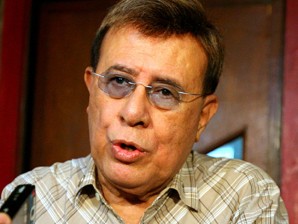MANILA, Philippines – Former Philippine Charity Sweepstakes Office (PCSO) chair Manuel “Manoling” Morato has disputed a Commission on Elections (Comelec) order for the filing of 2010 presidential election-related cases against him, asserting “there is no clear line dividing press freedom and the ban on electioneering.”
In a statement Sunday to the INQUIRER, Morato asked: “Is there a Supreme Court doctrine on this?”
“Why was I not reprimanded during the 2010 campaign period if they thought I was violating the law? Where [were] Director James Jimenez of Comelec who was in charge of monitoring campaign violations? Where [were] the Movie, Television Review and Classification Board, which is also tasked to monitor all TV programs for poll-related violations?” he said.
Morato, also a former MTRCB head, said “it proves they saw nothing really wrong, because most of the time I was cracking jokes in public.”
“To some viewers, Dial M was both a public service and comedy show. There’s no malice. We made fun of candidates who were lying or committing misdeeds. Would that be a sin? If they don’t like to be criticized then they should always behave properly,” he said.
The Comelec said on Friday it found probable cause against Morato for violation of election laws when he used his television show Dial M (on state-run channels NBN-4 and IBC-13) in 2010 to endorse the candidacies of Defense Secretary Gilberto Teodoro Jr. as president and actor Edu Manzano as vice president.
The poll body, through an en banc decision, directed its law department to file the criminal information against Morato in court.
The Comelec claimed Morato violated Section 261 of the Omnibus Election Code, when as member of the PCSO board authorized the release of public funds to air his TV program on May 3 and 5, 2010, which he used to support the candidacies of Teodoro and Manzano, as well campaign against senatorial bets Teofisto Guingona III, Francis Escudero and Risa Hontiveros-Baraquel.
As Dial M co-host, Morato “played a very important role during the May 2010 elections. His comments could change the political setup and influence the outcome of the elections. We can’t simply ignore the impact of his comments to the electorate during the May 2010 elections,” it said.
It also maintained that Morato had the “responsibility to safeguard public funds and not allow his program to be used for partisan political activity.”
The Omnibus Election Code prohibits the use of public funds, equipment and facilities owned or controlled by the government for an election campaign.
Morato explained he was “only one of the five directors or PCSO during the term of President Macapagal-Arroyo. As a director I had no power to the purse.”
“I was only a director and I cannot do that. That power belongs to high authority so much so that whenever a patient would come to me for help, I always sought for the approval of the PCSO chairman or general manager who was always empathetic to the poor,” he recalled.
According to Morato, “in fairness to the Comelec, the case did not emanate from them. PCSO chairman Margie Juico initiated it (maybe upon instructions from her bosses) to get back at me.”
“It was her retaliation for the corruption charges I filed against her before the Office of the Ombudsman for transferring $6 million in PCSO savings from the Land Bank of the Philippines to UCPB, a private commercial bank, which is against the law,” he claimed.
Juico has repeatedly denied Morato’s allegations. She earlier told the INQUIRER she would pray Morato “will have peace of mind.”
In his statement, Morato also cited Dial M for its “role in helping increase PCSO revenues.”
“During our time, PCSO revenues reached P30 billion a year. Dial M helped the PCSO assist thousands, if not millions of needy Filipinos,” he pointed out.
Morato added, “today, it’s an entirely different story. PCSO has become a gold mine for some people.”
